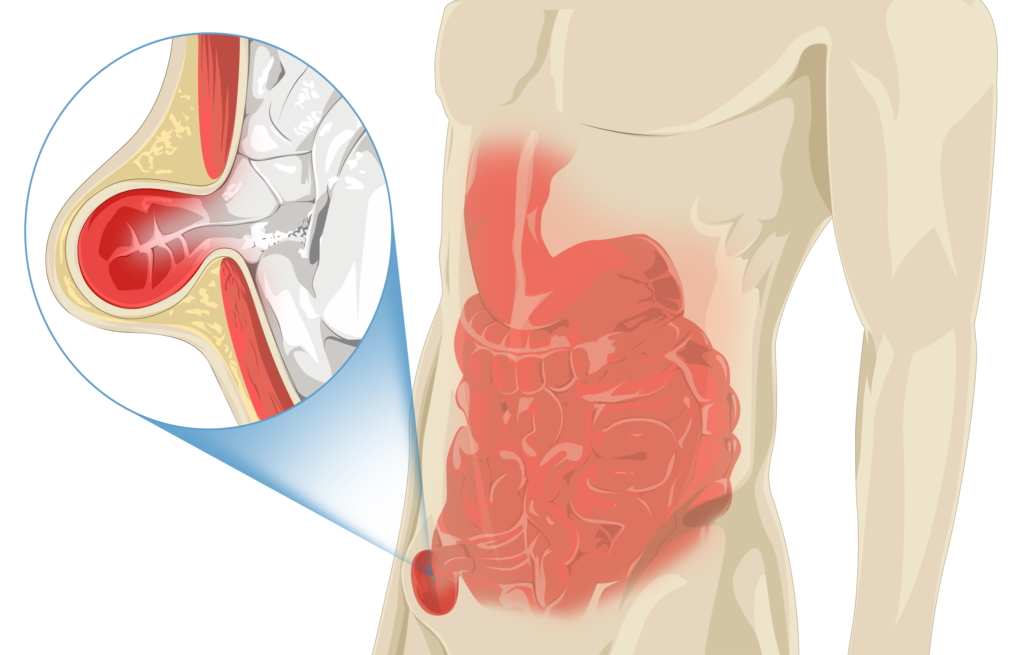Is Groin Hernia Serious – Diagnosis, Treatment, and Prevention in Singapore
Find out all you need to know about groin hernia...
Home > Inguinal Hernia

An inguinal hernia happens in your groin, in a passageway called the inguinal canal. Inguinal Hernia occurs when abdominal tissue, such as belly fat or a loop of intestines, bulges through an opening in the lower abdominal wall. This is the wall that separates your abdomen from your groin.
In men, inguinal hernias typically develop in the groin area near the scrotum, on one or bothsides. The lump often appears when you’re lifting something and disappears when you lie down.
An inguinal hernia can be categorized as “direct” or “indirect” depending on how and when it forms. There’s a good chance that the age and gender of the person with the hernia will have a lot to do with which type of Hernia it is.
A direct inguinal hernia penetrates directly through the wall of your inguinal canal. This type of hernia occurs in adults over time, typically from a combination of weakening abdominal muscles and chronic pressure on the muscle wall. This is most common in adult males.
An indirect inguinal hernia are congenital Hernias whichtypically develops in infancy when an abdomen area called the inguinal rings fails to close. Fat or part of the small intestine slides through the area of weakness into the inguinal canal, causing a Hernia. Most common in children, it affects up to 5 percent of newborns and up to 30 percent of premature babies. Premature infants are especially at risk for indirect inguinal hernias because there is lesser time for the inguinal canal to close, therefore increasing the risk for a Hernia to form. Often, it is discovered in the first year of life but can also remain undetected until adulthood.
Lower your chances of complications, see your doctor early and discuss your best treatment options.
Hernias aren’t always serious, but serious complications can develop. Hernias can worsen over time, this is because as the opening becomes weaker and wider, more tissue can push through it. The more this happens, the more likely it is to become trapped. This can be extremely painful, and in worst cases, can be life-threatening.
Some complications that can develop as a result of an inguinal hernia involves:
A part of the bowel becomes stuck in the inguinal canal, causing symptoms such as vomiting, nausea, painful lump and stomach pain
A section of the bowel becomes trapped and blood supply is cut off; this requires emergency surgery within hours to release the trapped tissue and restore its blood supply. It is a medical emergency as the strangulated tissue can release toxins in the bloodstream, causing infection that can lead to sepsis or even death.
Inguinal Hernias are therefore not something to be taken lightly. When in doubt, consult experienced Hernia Surgeon in Singapore Dr Kan today!



Surgery is necessary to push the protruding tissue back in place, remove any scar tissue, and adhere a surgical mesh on the hernia’s opening to prevent recurrence.
Our Hernia Surgeon in Singapore Dr Kan offers the full spectrum of surgical treatments for Inguinal Hernias, including minimally invasive/keyhole procedures such as laparoscopic inguinal hernia repair, which is typically the most common choice amongst experienced surgeons.
Advantages of this approach compared with open hernia repair include a lower risk of infection and a faster rate of recovery.
Find out all you need to know about groin hernia...
Discover when hernia is considered dangerous, the various hernia types...
Discover when hernia is considered dangerous, the various hernia types...
Here at KYM Surgery, we believe in providing holistic & comprehensive medical care for all patients.
Lower your chances of complications, see your doctor early and discuss your best treatment options.

We understand that hernias are worrying, but they can often be treated early. Here at KYM Surgery, we believe in providing holistic & comprehensive hernia care for all patients.
Hernia Surgery Clinic by KYM Surgery
Copyright © 2024 All rights reserved.